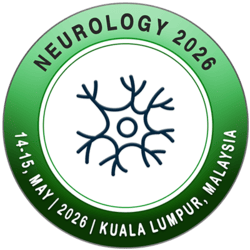Track: Neurochemistry and Neuropharmacology
_cleanup_(1).jpg)
Session Overview:
Dive into the complex and fascinating realm of neurochemistry and neuropharmacology in this in-depth session, designed to unravel the chemical processes underlying neurological and psychiatric conditions. Attendees will gain a comprehensive understanding of neurotransmitter systems, neurochemical pathways, and their impact on brain function and behavior. The session bridges basic neuroscience with clinical application, presenting the latest advancements in drug development and therapeutic strategies. Participants will explore how new pharmacological interventions are developed and tested, and the role of neurochemical biomarkers in personalizing treatment approaches. Through interactive discussions and case studies, the session aims to elucidate how recent research translates into clinical practice, enhancing therapeutic outcomes for neurological and psychiatric disorders. This session provides a platform for professionals to engage with pioneering research, share insights, and discuss future directions in neurochemistry and neuropharmacology.
Recent Developments:
Recent advancements in neurochemistry and neuropharmacology are transforming the field through various innovative developments. Novel neurotransmitter systems and receptors have been identified, offering new insights into brain function and potential therapeutic targets for neurological and psychiatric disorders. Concurrently, breakthroughs in drug delivery technologies, such as nanocarriers and targeted systems, are improving drug efficacy and reducing side effects by enhancing precision in brain distribution. The rise of precision medicine, supported by genetic and biochemical profiling, is leading to more personalized treatment approaches tailored to individual neurochemical profiles. Emerging neurochemical biomarkers are aiding in the diagnosis and monitoring of conditions, paving the way for targeted therapies and better treatment assessments. Artificial intelligence (AI) and machine learning are revolutionizing the field by analyzing large datasets to identify patterns, predict drug responses, and accelerate discovery processes. Robotics are also playing a crucial role in high-throughout screening and neuroimaging, increasing research efficiency. New drug innovations, targeting previously unexplored pathways, hold promise for breakthroughs in treating various conditions. Additionally, advancements in neurotoxicology are enhancing our understanding of the impacts of toxins and pharmaceuticals on brain health. Collectively, these developments are driving significant progress in neurochemistry and neuropharmacology, shaping the future of research and clinical practice.
Sub-Tracks:
Recent Developments:
Recent advancements in neurochemistry and neuropharmacology are transforming the field through various innovative developments. Novel neurotransmitter systems and receptors have been identified, offering new insights into brain function and potential therapeutic targets for neurological and psychiatric disorders. Concurrently, breakthroughs in drug delivery technologies, such as nanocarriers and targeted systems, are improving drug efficacy and reducing side effects by enhancing precision in brain distribution. The rise of precision medicine, supported by genetic and biochemical profiling, is leading to more personalized treatment approaches tailored to individual neurochemical profiles. Emerging neurochemical biomarkers are aiding in the diagnosis and monitoring of conditions, paving the way for targeted therapies and better treatment assessments. Artificial intelligence (AI) and machine learning are revolutionizing the field by analyzing large datasets to identify patterns, predict drug responses, and accelerate discovery processes. Robotics are also playing a crucial role in high-throughout screening and neuroimaging, increasing research efficiency. New drug innovations, targeting previously unexplored pathways, hold promise for breakthroughs in treating various conditions. Additionally, advancements in neurotoxicology are enhancing our understanding of the impacts of toxins and pharmaceuticals on brain health. Collectively, these developments are driving significant progress in neurochemistry and neuropharmacology, shaping the future of research and clinical practice.
Sub-Tracks:
Neurotransmitter Systems and Receptors
Explore the roles of neurotransmitters and their receptors in brain function and dysfunction. This sub-track focuses on recent discoveries of novel systems and their implications for therapeutic targeting.
Advancements in Drug Delivery Technologies
Examine innovations in drug delivery methods, including nanocarriers and targeted delivery systems, designed to improve the efficacy and precision of neuropharmacological treatments while minimizing side effects.
Precision Medicine in Neuropharmacology
Delve into how genetic and biochemical profiling is used to tailor neuropharmacological therapies to individual patients, enhancing personalized treatment approaches for neurological and psychiatric disorders.
Neurochemical Biomarkers
Investigate emerging biomarkers that aid in diagnosing and monitoring neurological and psychiatric conditions. This sub-track highlights the development and application of biomarkers for targeted therapies.
AI and Machine Learning in Drug Discovery
Discover how AI and machine learning are transforming drug discovery and development by analyzing large datasets, predicting drug responses, and optimizing treatment strategies in neurochemistry and neuropharmacology.
Neuroplasticity and Synaptic Transmission
Investigates how changes in neurochemical environments affect neural plasticity and synaptic communication.
Neuroinflammation and Neurodegenerative Diseases
Focuses on the role of neurochemical processes in neuroinflammation and their implications for diseases like Alzheimer’s and Parkinson’s.
Neurochemical Mechanisms of Cognitive Functions
Explores how neurochemical changes influence learning, memory, and other cognitive processes.
Drug Interaction and Side Effect Profiling
Examines the interactions between neuropharmacological agents and their potential side effects on neural systems.
Neurochemical Basis of Psychiatric Disorders
Studies the neurochemical underpinnings of various psychiatric conditions, such as depression, bipolar disorder, and schizophrenia.
Scientific Highlights
- Neurology
- Neuro Anatomy
- Mental Health and Psychiatry
- Geriatric Neurological Disorders
- Neuromuscular Diseases
- Brain Tumor and Neuro-oncology
- Cerebrovascular and Critical Care Neurology
- Clinical Neurophysiology
- Central Nervous System
- Neuro-Ophthalmology
- Pediatric Neurology
- Neuroimaging and Brain Mapping
- Neurogenetics and Neurodegenerative Disease
- Behavioral and Cognitive Neuroscience
- Neurochemistry and Neuropharmacology
- Spinal Neurosurgery and Neural Transplantation
- Neuro Robotics and Neuro Modulators
- Addiction and Adult Psychology
- Brain Stimulation and Computational Neuroscience
- Neural Control of Micturition
- Parkinson's Disease


